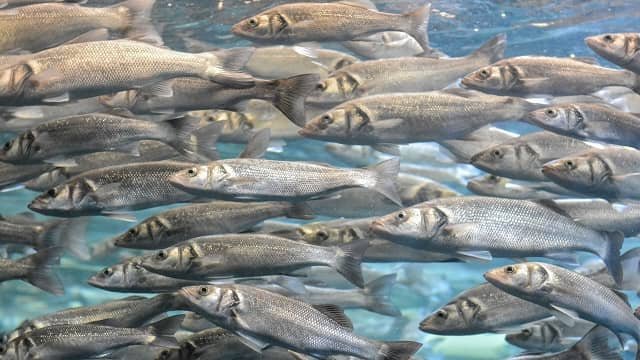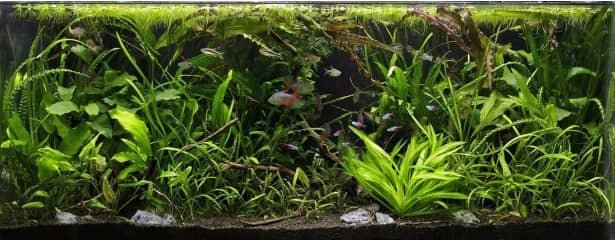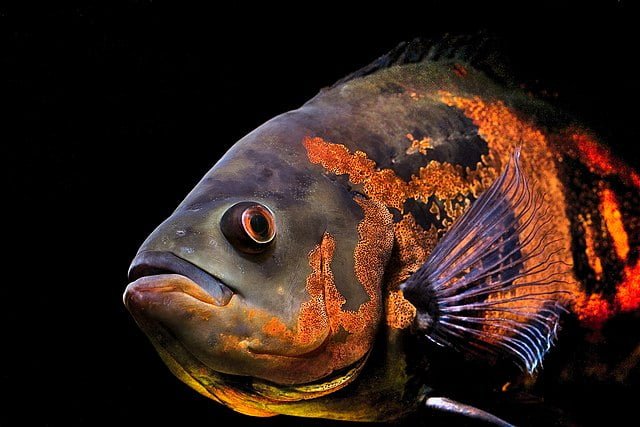
Have you ever wondered if the fish swimming in the aquariums of your local pet store or swirling in the tanks of aquaculture farms are living their best lives? Understanding their emotional state, while challenging, is crucial for ensuring their well-being. Until recently, deciphering the fish’s mind remained a mystery.
A joint research effort by the Instituto de Acuicultura Torre de la Sal (IATS), center from Consejo Superior de Investigadores Científicas (CSIC) en Castellón, y del Instituto Gulbenkian de Ciência (IGC) in Portugal has shown that certain unexpected positive events, such as unexpected feeding, can improve the affective state of European seabass (Dicentrarchus labrax) juveniles, one of the most produced species in aquaculture in Spain. This study, published in the journal Scientific Reports, could contribute to improving the welfare of fish in captivity and promoting more ethical and sustainable practices in aquaculture.
The research team, composed of M. Victoria Alvarado, Felipe Espigares, and Rui F. Oliveira from the IGC’s Integrative Behavioral Biology Group, in collaboration with Alicia Felip from the IATS-CSIC’s Fish Reproduction Physiology Group, conducted experiments with European seabass juveniles to develop a judgment bias test adapted for this species. The resulting protocol has been used as a non-invasive tool to assess the affective state of fish in laboratory and cultivation conditions.
Seabass as an experimental model
Certain fish species, such as seabass, are particularly vulnerable to specific external factors associated with animal husbandry, such as human intervention in daily care. This vulnerability can lead to physiological and behavioral changes in these animals. The juvenile stage is a crucial period for seabass, as during the first months of life, individuals in the population have not yet differentiated sexually and are more vulnerable to adverse external factors, such as those related to handling or introduction to new environments.
“Certain farming conditions can, therefore, have a profound impact on the biology of the animal, significantly affecting its development and growth,” explain the scientists who conducted the research. Adverse conditions often induce a negative affective state in juveniles, negatively impacting the well-being and health of the animals and causing economic losses for the aquaculture sector. This underscores the importance of developing tools to assess the affective state of animals in captivity and implementing strategies for improvement.
Tendency toward “pessimism” in artificial environments
Like humans, seabass exhibit a range of optimism and pessimism, with some individuals consistently choosing the “safe” option and others venturing into the unknown.
The study focused on juvenile seabass, known to experience stress and anxiety in captivity. Researchers designed a special test, presenting these fish with clear and dark areas and observing their choices. The results were revealing: captive seabass, as a whole, strongly leaned towards the pessimistic side, consistently favoring the “safe” light zone. This suggests a possible negative affective state associated with their captive environment.
Judgment bias in animals is a decision-making process in which some individuals interpret an ambiguous stimulus as positive (optimistic), while others interpret it negatively (pessimistic). In this way, individuals in a negative affective state are more likely to assess ambiguous stimuli as negative, resulting in the manifestation of pessimistic behaviors.
The study’s results revealed a clear tendency of juvenile seabass toward pessimistic behaviors in artificial environments, such as the experimental tanks used in the research. However, upon receiving a positive stimulus in the form of unexpected food rewards, a shift in juveniles towards more optimistic behaviors was observed, indicating an improvement in their affective state.
Stay Always Informed
Join our communities to instantly receive the most important news, reports, and analysis from the aquaculture industry.
Impact on seabass farming
Understanding judgment bias in fish can help assess their well-being in captivity. Farm and laboratory environments can be stressful, as artificial lighting, limited space, and human interaction can cause anxiety and pessimism. By measuring judgment bias, we can gain valuable insights into their emotional health and identify areas where we can improve their living conditions.
Animal well-being in farming conditions goes beyond the absence of diseases and achieving adequate growth. “It also involves promoting a positive affective state that facilitates individuals’ adaptation to captive environments,” according to the scientists in charge of the study. Therefore, this work not only contributes to a better understanding of potential strategies aimed at improving the well-being of aquaculture species but also highlights the importance of such research in promoting more ethical and sustainable practices in aquaculture.
Conclusion
The research sheds light on the intriguing link between internal emotions and fish behavior. It also paves the way for the use of judgment bias tests as a powerful tool in aquaculture. By tracking levels of optimism and pessimism, we can gain valuable information about fish well-being and identify areas for improvement, creating more suitable and healthy environments for fish.
The study was funded by the Fundação para a Ciência e a Tecnologia and the Ministry of Science and Innovation of Spain.
Contact
F. Espigares
Integrative Behavioural Biology Group
Instituto Gulbenkian de Ciência
2780-156, Oeiras, Portugal
Email: felipe.espigares@gmail.com
Reference (open access)
Alvarado, M.V., Felip, A., Espigares, F., Oliveira, R.F. Unexpected appetitive events promote positive affective state in juvenile European sea bass. Scientific Report 13, 22064 (2023). DOI: https://doi.org/10.1038/s41598-023-49236-5
Note: The article has been prepared using information from the press release and the scientific study.
Editor at the digital magazine AquaHoy. He holds a degree in Aquaculture Biology from the National University of Santa (UNS) and a Master’s degree in Science and Innovation Management from the Polytechnic University of Valencia, with postgraduate diplomas in Business Innovation and Innovation Management. He possesses extensive experience in the aquaculture and fisheries sector, having led the Fisheries Innovation Unit of the National Program for Innovation in Fisheries and Aquaculture (PNIPA). He has served as a senior consultant in technology watch, an innovation project formulator and advisor, and a lecturer at UNS. He is a member of the Peruvian College of Biologists and was recognized by the World Aquaculture Society (WAS) in 2016 for his contribution to aquaculture.







